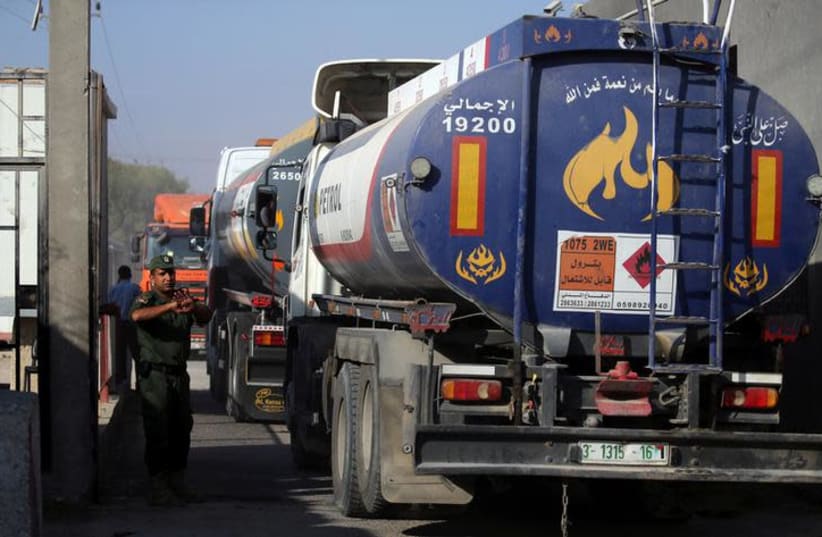A Related Video You May Like:
Prime Minister Benjamin Netanyahu, at a press conference Thursday with visiting German Chancellor Angela Merkel, called on the world to tell Palestinian Authority President Mahmoud Abbas to stop “choking” Gaza, something that “could lead to very difficult consequences.”Netanyahu said that over the last year, Abbas “has made the situation in Gaza more difficult by choking off the flow of funds from the Palestinian Authority to Gaza. As a result of this chokehold, pressures have been created there and as a result of the pressures, from time to time Hamas attacks Israel at a relatively low intensity, but the chokehold is tightening.”Netanyahu said that Abbas has “interfered in all UN attempts to ease the plight in Gaza, including now and, of course, many countries, today I can say that even the donor countries are condemning him for this, and rightly so.”According to the United Nations Office for the Coordination of Humanitarian Affairs (OCHA), the Gaza Strip has suffered from a chronic electricity deficit for the past decade.“The situation has further deteriorated since April 2017 in the context of disputes between the de facto authorities in the Gaza Strip and the West Bank-based Palestinian Authority,” OCHA said. “The ongoing power shortage has severely impacted the availability of essential services, particularly health, water and sanitation services, and undermined Gaza’s fragile economy, particularly the manufacturing and agriculture sectors.”According to a report in Haaretz last week, Qatar has agreed to finance the purchase of fuel for the Gaza Strip’s power plant. The arrangement, which was reached at the recent conference in New York of countries that donate to the Palestinians, is supposed to go into effect in the coming days and would allow a significant increase in the power supply to the Palestinians in the Gaza Strip, the report said.Israel, the report added, hopes that this development will reduce the risk of a military confrontation with Hamas.Palestinians in the Gaza Strip currently have around five hours of electricity each day.Last year, Abbas imposed a series of economic and financial sanctions on the Gaza Strip as part of his effort to force Hamas to relinquish control over the coastal enclave.Khalil al-Hayya, a senior Hamas official in the Gaza Strip, said on Saturday that the weekly protests along the border with Israel will continue until the blockade on the area is lifted. He said that Hamas was not scared of Israeli threats to launch a military operation in the Gaza Strip in response to the ongoing violence along the border.Addressing Israel, Hayya said: “Lift the blockade imposed on the Palestinian people and give them their rights so that calm will prevail. Otherwise, there will be no calm in the region and along the border.”A PA official in Ramallah told The Jerusalem Post that Abbas was facing pressure from some Arab countries and international parties to lift the sanctions he imposed on the Gaza Strip. Abbas is also under pressure to avoid taking additional punitive measures against the Gaza Strip in wake of the failure of recent efforts by Egypt to reach a new “reconciliation” deal between Abbas’s Fatah faction and Hamas, the official said.Abbas, the official added, is strongly opposed to efforts made by Egypt and the UN to achieve a truce deal between Hamas and Israel.“Hamas is not authorized to reach any deal with Israel,” he explained. “The PLO, the sole legitimate representative of the Palestinian people, is the only party authorized to sign deals with international parties. Hamas is just another Palestinian faction.”Abbas argues that a separate deal between Israel and Hamas will solidify the split between the West Bank and the Gaza Strip, and transform the Palestinian cause into an issue that solely concerns humanitarian and financial aid.Abbas is scheduled to hold a series of meetings with Fatah and PLO officials in Ramallah in the coming days to discuss the ongoing crisis with Hamas and efforts to achieve a new truce deal with Israel. Abbas is expected to affirm during the meetings his opposition to easing restrictions on the Gaza Strip before Hamas allows his Ramallah-based government to assume full responsibilities there.
Hamas: Israel ready to help, but PA blocking fuel to Gaza power plant
Netanyahu calls on Abbas to stop ‘choking’ Gaza to prevent ‘very difficult consequences’
